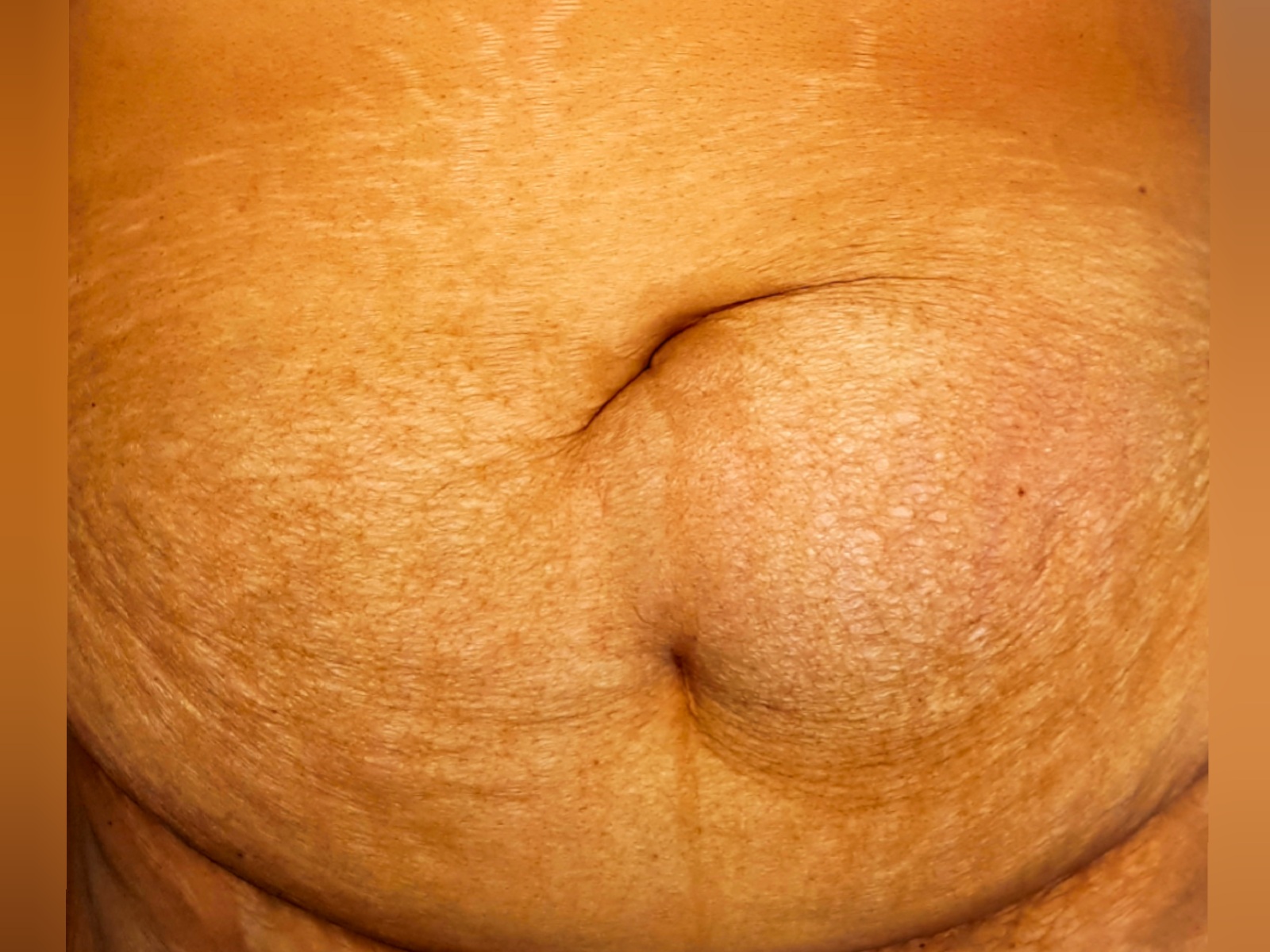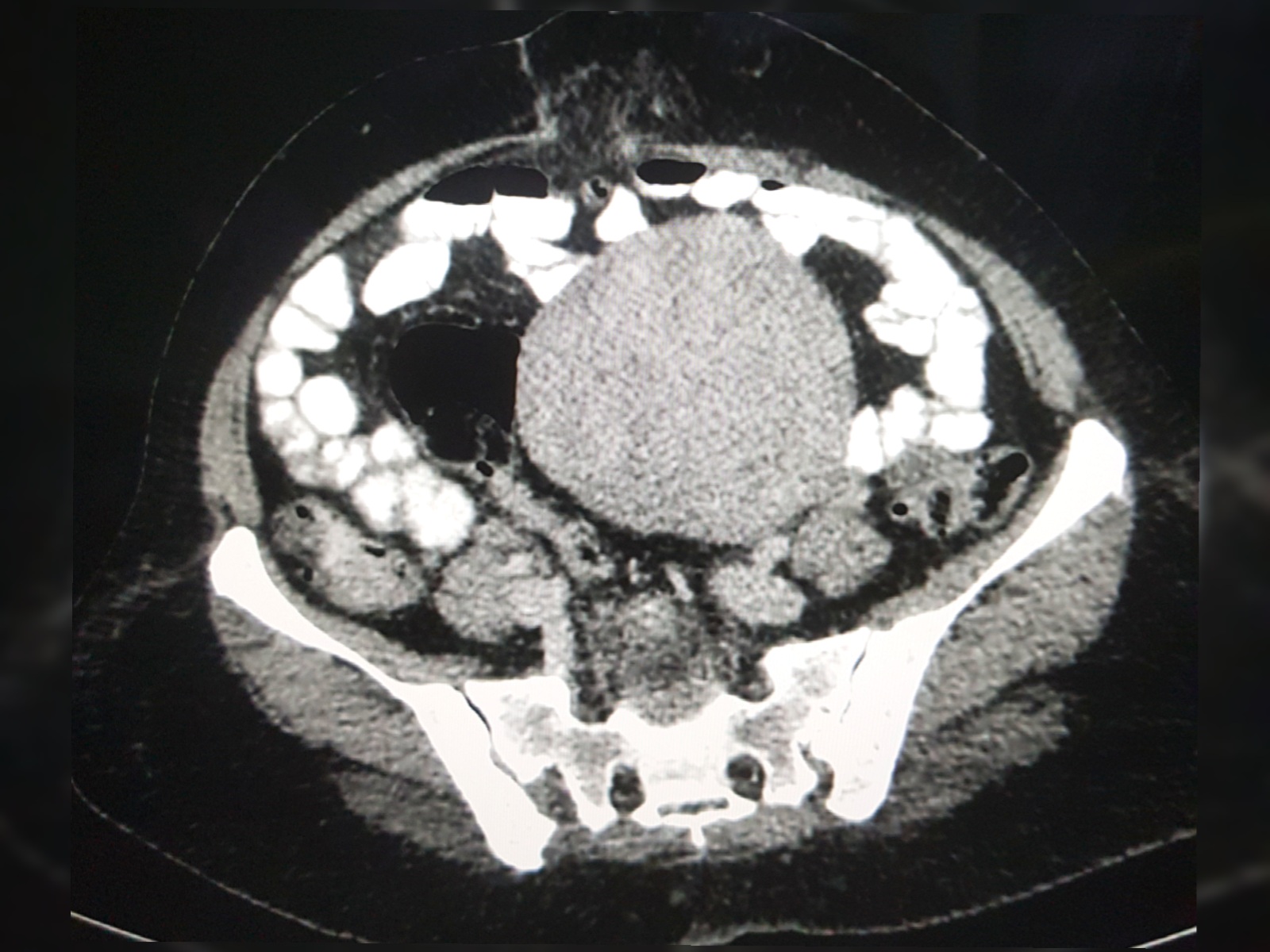-


An incisional hernia is indeed a type of hernia caused by a surgical wound that hasn't healed entirely. Although abdominal exploratory surgery frequently involves median incisions, incisional hernias are frequently classed as ventral hernias due to their location. It can arise as a result of abdominal surgery. An incisional hernia can be caused by a variety of reasons, some of which may increase or decrease your risk.
Incisional hernia when tissue, such as part of the intestine, protrudes through a prior surgical incision on the abdominal wall. Incisional hernia can happen anywhere and anytime after a prior surgery. Patients usually complain of a bulge or pain at the prior surgical scar. Sometimes patients can have severe symptoms with pain nausea vomiting and may need immediate attention.
Incisional hernia can happen at any time after surgery. The most common risk factor for incisional hernia is prior surgery. Other risk factors that contribute are poor tissue integrity, diabetes, obesity, prior or current steroid use and smoking. It is better for most patients with incisional hernia to have a CT scan of the abdomen to further evaluate the hernia. CT scans are also helpful in formulating the types of incisional hernia surgery.
Incisional Hernia Symptoms
An incisional hernia is defined by a bulge under the skin near or beneath the incision scar. Hernias are often painless or cause an occasional 'ache' after physical activity. In some cases, however, the pain will be quite marked. Incisional hernias can also cause the following symptoms:
- Redness and a burning sensation in the bulge
- Pain that increases when straining or lifting heavy objects.
- Constipation, which can occur as a result of scar tissue blocking the intestines,
- Nausea and/or vomiting, in the case of infectionIncisional Hernia Causes
An incisional hernia occurs when abdominal contents protrude through an incision in the abdominal wall that was made during a previous surgical operation. When conducting an operation, a surgeon will make an incision to reach a patient’s internal organs. The surgeon will then close the layers of the abdominal wall with stitches once the operation is completed. An incisional hernia can develop if the closure fails to heal properly or the stitches come apart over time.
Incisional Hernia Diagnosis
A health care provider may use a variety of diagnostic techniques to diagnose an incisional hernia, but they will begin with a medical history and physical examination. The doctor will inquire about and/or search for the following:
- Constipation, "thin" or "narrow" stool
- A lump or protrusion in the abdomen near or at the site of a previous incision; the patient may be asked to stand and cough, which tends to accentuate the hernia.
- Nausea, vomiting, fever or rapid heart rate.
- Pain in the abdomen, especially around the protrusion
- Previous surgeries, locations, and outcomesThe blood supply to the intestine can be cut off (strangulation) if the protruding portion of the intestine becomes trapped (incarcerated) within the abdominal wall, causing further complications such as necrosis (tissue death). Additional diagnostics may be necessary if your physician suspects this is the case:
- Blood tests to look for infections caused by intestinal blockage or necrosis.
- Ultrasound, MRI, CT or other imaging to check for blockage or the actual location of the intestinal protrusion -
Surgery
There are two types of surgeries that are offered for patients suffering from incisional hernia. Open hernia repair with mesh and the other most common type of surgery is Laparoscopic hernia repair with mesh. Broadly these surgeries based on the technique can be classified as OPEN SURGERY and MINIMALLY INVASIVE SURGERY. Dr. Manjunath Haridas is the best hernia surgeon in Bangalore, and has 20+ years of experience.
OPEN SURGERY- Open Incisional hernia repair with mesh
Open surgery involves open technique. Here an incision is made on the hernia and the hernia is reduced . The contents of the hernia is reduced and the edges of the abdominal wall are identified and are approximated over a mesh. The placement of the mesh is a choice but the standard of care is to place a mesh within the muscles or peritoneum to avoid any contact with the bowel. The surrounding structures are evaluated and the incision is closed.
Open surgery is usually more painful than the minimally invasive surgeries. But there are various medications that we use to help you have better pain control.
For this surgery you may need a complete blood count (CBC), chemistry profile, PT, PTT. Depending on your medical history, we may require additional testing: chest X-Ray, EKG, medical clearance from your primary care physician, cardiac clearance from your cardiologist, additional blood work and finally Anesthesiology clearance.
We recommend that you have your blood work done before having the surgery performed. If this is not possible, please notify the surgical scheduling team at 8884200030.
MINIMALLY INVASIVE SURGERY- Laparoscopic Incisional Hernia Treatment With Mesh
Laparoscopic surgery involves minimally invasive technique. Here we make small 5 mm incisions on the side of the abdomen and small 10 mm incisions are also made. The abdomen is entered and the contents of the hernia is reduced and the defect is measured. Here the defect is closed in some situations while in some it is not. But the defect is overlapped with a composite mesh and fixed. The surrounding structures are evaluated and the incision is closed.
Laparoscopic surgeries are usually less painful than the open surgeries. We still give you pain medications and nerve blocks so that you feel comfortable and are able to walk about six hours after the surgery.
For this surgery you may need a complete blood count (CBC), chemistry profile, PT, PTT. Depending on your medical history, your physician may require additional testing: chest X-Ray, EKG, medical clearance from your primary care physician, cardiac clearance from your cardiologist, additional blood work and finally Anesthesiology clearance.
We recommend that you have your blood work done before having the surgery performed. If this is not possible, please notify the surgical scheduling team at 8884200030.
-
Patient education
BEFORE SURGERY
Please refer to the instructions below in preparation for your surgery. Proper preparation is essential to obtain the best surgical experience and results. Please note that failure to follow these instructions may result in rescheduling your surgery. Our laparoscopic surgeon in Bangalore will contact each patient directly and will be available to answer any additional questions about surgery, scheduling and instructions.
PRE-OPERATIVE TESTING
You may need a complete blood count (CBC), chemistry profile, PT, PTT. Depending on your medical history, your physician may require additional testing: chest X-Ray, EKG, medical clearance from your primary care physician, cardiac clearance from your cardiologist, blood work and anesthesiology clearance.
We recommend that you have your blood work done at the hospital where you are having the surgery performed.Please download instructions below if you need any further instructions, please notify the surgical scheduling team at 8884200030
-
why us?
Our best laparoscopic surgeons in Bangalore are well known internationally in their field. They are experts in the diagnosis and management of various conditions, and innovation of minimally invasive surgery techniques. Our team provides a personalized approach for each patient, offering advanced surgical solutions. Our surgeons educate physicians on innovative techniques through national,international presentations and web-based seminars.
Specific treatment for an incisional hernia will be determined by your doctor based on multiple factors such as your general health, anatomy, extent and location of the hernia. The incisional hernia treatment will also depend on whether the hernia has negatively affected the results of the original surgery, requiring additional procedures before the hernia can be closed. In general, there are two specific methods surgeons use for ventral hernia repair: open surgery and laparoscopic surgery.
To avoid any complications and get the best treatment, choose MH Surgery as our laparoscopic surgeons in Bangalore are experienced and perform highly advanced surgeries. If you experience any symptoms, please consult ventral hernia surgeons or book an appointment with us.
Frequently Asked Questions
Answer: An incisional hernia is a swelling of the tissues that develop at the site of a healing surgical scar caused by an incisional hernia surgery. The peculiar bulge of an incisional hernia can be easily identified when you stand upright or are engaging in any physical activity like heavy lifting. Since incisional hernias generally take place at the front of the abdomen, they have mainly been considered a type of ventral hernia. In order to identify an incisional hernia, your healthcare provider can use multiple diagnostic tests but they will start with your medical history and physical examination. They will ask you about and look for the following:
- Constipation
- Vomiting, nausea, rapid heart rate, or fever
- Lump or bulge in the abdomen either at or near the site of the previous incision. They may also ask you to stand and cough which makes the hernia more pronounced
- Any previous surgeries, outcomes, and locations
- Pain in the abdomen around the bulge
If the swelling area of the intestine has become incarcerated within the abdominal wall, the blood supply to the intestine will get cut off, thereby resulting in further complications like necrosis. If your doctor suspects any such thing in your case, then further diagnostics may include:
- MRI, ultrasound, CT, or other imaging to see any blockage or actual location of the intestinal protrusion
- Blood tests to check for infections that may have caused due to intestinal blockage or necrosis
There may be other tests if your doctor believes the rupture has caused the protrusion of other organs apart from the intestines. In many cases, only the abdominal lining starts to swell up, thereby making incisional hernias less serious as opposed to other types of hernia. Nevertheless, this type of hernia does not really heal on its own and calls for a surgical incisional hernia treatment or repair. If you had abdominal surgery, you are at risk of developing an incisional hernia which is susceptible three to six months after the procedure when the tissues are still healing from the incision. Any exhausting activity, significant weight gain, or pregnancy can cause a lot of stress on the healing of the abdominal tissue and must be prevented during this healing period.
Answer: Incisional hernia treatment will be determined by your health care provider depending on various aspects such as your anatomy, general health, extent, and location of the hernia, and required level of future physical activity. The hernia treatment will also be based on whether your incisional hernia has affected the results of the original surgery negatively, thereby needing additional procedures before the hernia can be closed. There are mainly two types of incisional hernia surgery:
- Laparoscopy
Laparoscopy is a minimally invasive surgical procedure in which the incisional hernia surgeon makes multiple incisions in the lower abdomen and inserts a tubelike instrument that is equipped with a tiny camera into one of the incisions. The internal images are then demonstrated on a large monitor that the surgeon uses to guide the instrument that is inserted through the other incisions for the incisional hernia repair.
- Open Hernia Surgery
Open hernia surgery, also known as herniorrhaphy, comprises the procedure in which the incisional hernia surgeon makes an incision in the abdomen above the hernia, pushes swelling intestines back into your abdomen, and repairs the incision in the muscle wall. There is also a procedure known as hernioplasty in which the weak portion is repaired and strengthened with steel wire or mesh.
Answer: After your incisional hernia repair , you will be sent to the recovery room where the nurses will keep check on you for a couple of hours until you are awake. You may even be told to go home the same day or you may be asked to stay in the hospital for a night or two. This mainly depends on how complicated your incisional hernia surgery was as well as your general health. Nevertheless, we recommend you plan to stay for several days (5-7 days) after your surgery. Based on the size of the hernia, some patients are asked to spend the first night after the incisional hernia surgery in the intensive care unit.
Answer: Your incisional hernia doctor at MH Surgery Clinic will hand out the discharge instructions and address any particular precautions you must take in your condition. Here are a few common precautions that we suggest to all our patients:
- Make sure to eat as soon as possible, however, start off with liquids and eventually add in small meals. Keep a close eye on your appetite and do not panic if you are not as hungry as usual.
- Keep yourself hydrated, and make sure to drink 6 to 8 glasses of fluids every day.
- Keep taking the prescribed pain medication but make sure to switch to acetaminophen or ibuprofen as soon as you can tolerate it. This will help you curtail any constipation or nausea from narcotics
- Wear comfortable, loose, breathing clothing that does not rub against the incision.
- Make sure not to consume alcohol while you are on narcotic pain medication.
- Try to keep yourself active and take short walks. This will help in preventing any blood clots.
- Take enough rest and naps in the afternoon if you can. After the surgery, you will notice that you become tired or exhausted more easily. This fatigue is likely to fade off within 6 weeks.
- Do not go for a swim, take a bath, or relax in a hot tub for nearly 2-3 weeks as spending time in the water will increase the risk of your incision getting infected. Instead, take a shower and follow your discharge instructions about how to take care of your incisions.
- Make sure you follow discharge instructions handed out by your incisional surgery doctor in order to take stool softeners. You must also take 20-35 grams of fiber every day to prevent constipation.
Answer: You will be asked for a full physical examination which may include some tests in order to make sure that you are healthy enough for incisional hernia surgery. The doctor who will perform your laparoscopic incisional hernia repair will talk to you about the benefits as well as risks of surgery. The staff at MH Surgery Clinic will tell you what you should do before the surgery and what you should avoid. Some of the common things to do before the surgery are as follows:
- You must stop taking certain medicines such as blood thinners, aspirin, and other supplements like Vitamin E before your surgery. Make sure not to take diet medications two weeks before surgery. Talk to your incisional hernia surgeon about what medications you should stop taking before surgery.
- Smoking may increase the risk that your hernia will recur even after surgery. It can also make you vulnerable to infection. Your doctor will ask you to quit smoking 4 to 6 weeks before surgery.
- Stop drinking and eating at the time your doctor asks you as they may need your intestines to be empty and clean before performing surgery. You may also be asked to drink a special cleansing solution or clear liquids for a while before you are taken inside the OT.
- Take a long shower the same morning or the night before surgery. Your incisional hernia surgeon may also ask you to use an antibiotic soap.
In basic hernia situations, the surrounding muscles are stitched together to eradicate the weakness. The durable mesh use mesh in order to prevent the hernia from recurring. In some cases, the hernia is repaired the same day that the surgery is performed. On the other hand, more complex hernia repairs require you to stay in the hospital for a while for pain control and further monitoring.
Answer:We are proud to announce that Dr. Manjunath Haridas uses a mesh for incisional hernia repair as the mesh has become standard practice to repair incisional hernias. This is because the mesh alleviates loss of domain and helps in maintaining the rectus in the midline where they function properly.
Answer:A mesh is basically a medical device used for providing additional support to damaged or weakened tissue. Most mesh devices available are developed from animal tissue or synthetic materials. The most common complications of mesh use are infection, pair, recurrence of the hernia, bowel obstruction, and adhesion. There are some other adverse events that can take place following an incisional hernia repair with mesh are mesh shrinkage (contraction) or mesh migration.

